When making a series or film based on a video game—which very rarely ever comes out well—it is always important to keep in mind that you are catering to two very different audiences. On the more important hand, you need to make sure the content is faithful enough to keep the fans happy and that the story has at least some semblance to what it is based on for rights sake. On the other hand, the point of the movie is also to sell; you want to cater to new viewers based on what the masses in your targeted age group wants to see, whether they are fans of the original game or not. It seems like a cynical tactic, but it works both ways, perhaps when bringing in new viewers with an interesting concept will end up pleasing both groups, and even encourage new viewers to play the original games given that they are not too dated, which isn’t the case for Castlevania.
I’ll start with the obvious question on everyone’s mind when reading this review: yes. They do. Absolutely. For how short this animated adaptation of the classic series Castlevania, the show is great, is loads of bloody fun, and faithful to even more than the most acclaimed title, such as Castlevania III: Dracula’s Curse.
The four part series includes much of the mythical lore based on the series’s magnum opus, Castlevania: Symphony of the Night. While the series does take certain creative liberties when building a huge world in a very short period of time (a little under two hours of content), it does so by respecting what little story the NES classic had and filling in the background world with information told by Alucard in Symphony of the Night while mixing in a bit of their own story that works well in context to the overall plot.
The choice to go animated rather than live-action was something I was initially distraught over, but in the end I was convinced that it was a great choice. Given that the games themselves were obviously also animated, it was only natural to keep this same style of film. While the earlier games were 8-bit style and contained no blood whatsoever, the later titles like Symphony of the Night and Lament of Innocence are regarded as some of the bloodier games of their respective eras of video games. Just as well, the adapted series is very generous when it comes to its graphic content.
That’s not the only thing in common with the games however. From the score to specific references and even down to the most minuscule of details, the series plays as homage to Castlevania as a whole, one that especially caters to both the die-hard fans and people who like heavily action and horror based anime.
Witchbottle
The first episode of the four part mini-series, Witchbottle, opens with the classic imagery of Castlevania’s classic game Dracula or his alter persona, Vlad Tepes. Like the historical counterpart, his lands are covered with the bodies of those whom he has impaled on stakes. Then enters the future Lisa Tepes, who in the series they made a healer of sorts. She has come to Dracula to learn the mystic ways of higher healing to become a true doctor and not simply seen as a witch, as it is already. With some well-crafted dialogue (for anime), the two divulge more personal information about each other and she whole heartedly convinces him to try and be more human and to see what the worlds people still have to offer.
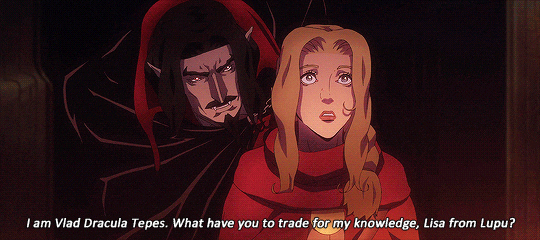
The episode then moves over to Wallachia in 1475, where players of the game will know is the setting for Castlevania III. The scene is taken from Symphony of the Night from Alucard’s nightmare where Lisa Tepes is burned alive as a witch. If you have never played the game before, spoiler, but Alucard of course is the half breed son of Dracula and Lisa. As she burns she screams out to her beloved to forgive them for what they are doing, for they do not know; to be better than them. Then cue the opening credits.
After the credits, we return to Dracula walking towards Wallachia, unaware of what just transpired there. An old woman instantly recognizes him as Vlad Tepes and offers her condolences and well-wishing about how good a person Lisa was. At this revelation a great rage consumes him, stating his last kindness was to let this woman pack up her family and leave before he has his retribution. This was well done; in the original video game Dracula was only doing what he does and making war on Europe. The series gave him a purpose, and sympathetic one at that. While the third game did (for the first time) name him Vlad Tepes of the novel by Bram Stoker, they could not be sure that everyone had read it and known who Lisa Tepes was or what about her made him evil, but I digress.
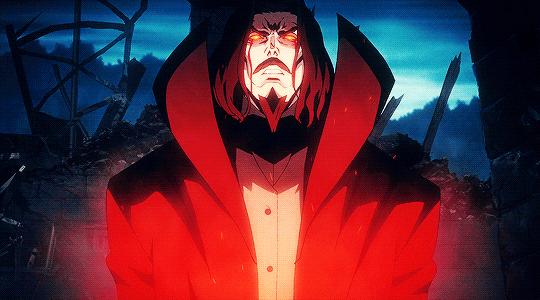
After the burning is through, Dracula appears to the clamoring group of watchers in his famous pillar of fire style (see almost every boss battle against him). He comes full of rage and anger, exclaiming that she was the only connection that kept him from exterminating humanity. With that he gives them one year to settle their affairs, for after that, he will exterminate mankind. I would have expected his partner in crime, Death, to appear by now, but instead his son, Alucard, speaks out against the raising of an army. He says that if he must find vengeance let it be against the people who took her life, not humanity as a whole, not innocents. He is not able to reason with his father, and all we see is Dracula strike and a screen cap of splattered blood.
Back in Wallachia a year later, the religious leader tries calling out Dracula on his bullshit just as he begins his demon invasion of the city. The skies begin to rain blood and demons drop from the sky, the church is engulfed in a tempest of fire as Dracula reappears to seal their reckoning. In the destroyed churches wake, Dracula’s castle rises and the slaughter beings. The next few minutes are just bloody and gore filled mayhem as the streets run red with death. As the city becomes overrun, Dracula instructs his minions to kill everything in the city and move on from city to city and do the same.
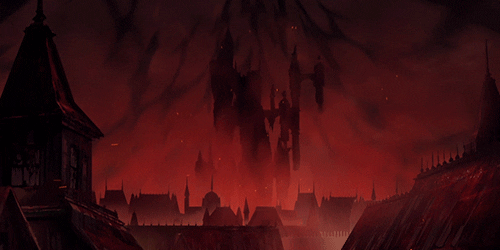
The Final scene of this episode is an introduction to Trevor Belmont, of the Belmont family of Vampire killers. Like the game, the Belmont’s were exiled from Wallachia for reasons concerning to their “Family business” Yet in the game they are called to help rather than Trevor just happening to be in the area. We see just how much the Belmont’s are hated by the way the inn keep bashes their name. The episode ends with Trevor realizing he shouldn’t be there.
Necropolis
The second episode, Necropolis, open where the first ended. Trevor is trying to enjoy a drink in an inn full of Belmont haters, trying to keep to himself and his temper under control.
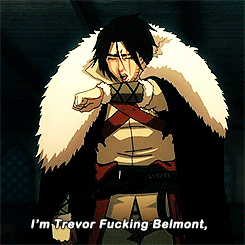
According to these peasants these “great” families like to make war with one another and the poor are who suffer when they decide to play their games. A drunk Trevor accidentally lets his Belmont crest show and this causes a brawl. He holds back at first but by the end the patrons gang up on him and he takes a pretty bad beating.
The next day Trevor awakes to another city overrun by demons and the ghastly site of a dead baby being dragged away by demons. He sneaks into the city by way of a waste sewer and sees just how much damage this invasion has already dealt. It seems this city is not completely occupied yet as there are stills guards (sleeping ones at least) patrolling the area and shelters set up for the wounded. Trevor has little care for their woes at this point. After asking around what is left of the markets, he’s left with the legend of a sleeping hero. To gamers it’s obvious who it is.
Spoilers again…it’s Alucard. Trevor also finds out that the demons only attack during the night but by day the bishop and his men are just as ruthless as the demons and take to any sort of heresy with the utmost harshness. A tribe of Speakers (sort of gypsy like nomads who act as oral historians and healers) is also in town helping with the wounded and doing what they can.
We get our first meeting with a Speaker as Trevor encounters two of the Bishops men bullying him, accusing him of black magic. Trevor still has some morality attached to him as he whips the martial clergymen into submission with one losing a finger and the other an eye in some exciting whip combat which the series is known for. The music is also very classical with a modern touch, another trademark of the game series.
Trevor follows the Seeker Elder to the rest of his congregation, mentioning that one of their number is missing. Trevor notes that his family has always been on good terms the Speakers. Turns out the Church is blaming them for the demon attack, they refuse to believe in Dracula, being nomadic and sticking around has of course raised suspicion. While they are there to help, yet they are also there to awaken this sleeping hero to save the lands from Dracula’s hordes.
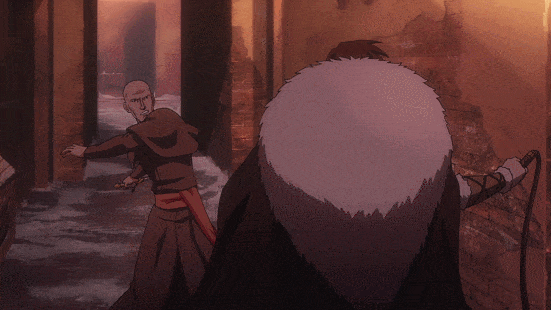
It turns out one of the Speakers went into the city’s catacombs to seek out this legend but never returned. Trevor becomes very cold to their case, reminding the Elder that the people of Wallachia cast out the Belmont’s, killing, burning and the like, so why should he have any compassion to them at all. They wanted to fight Dracula’s horde alone and so he would leave them to it. Like Dracula said earlier in the episode, people can fight power, all they need to do is speak up.
After this, it is revealed that the missing speaker is the Elders grandchild and whether living or dead, they want the body. We see that Trevor still has a heart but also a darkness in him. He makes an oath to save their missing Speaker, for a price. They have to leave by nightfall when he finds her; he doesn’t want to see the people massacre them, from what he heard in the market it is what is on some of their mind. “Good” people always need someone to blame.
Final Thoughts
The opening episodes set up nicely a great series to come. Though it is so short, it feels like a prologue within a prologue. We are introduced to main protagonist and antagonist and given a good amount of backstory to be able to identify what makes the villain sympathetic and what makes our hero broken and lost. The world building is excellent for what little time was allotted to showing it off. The violence and gore will definitely appeal to those looking for some of the horror aspect that derives from the series. In short, fans of the series will feel right at home as well with the themes, music and characters they know all too well.
Like all good narratives we also get some real world issues thrown into the mix. Here, it is that power corrupts. It is not secret that the world has always faced a problem in identifying that there should be a very clear distinction between the Church and politics. We also get a very human reaction to what fear can do en masse.
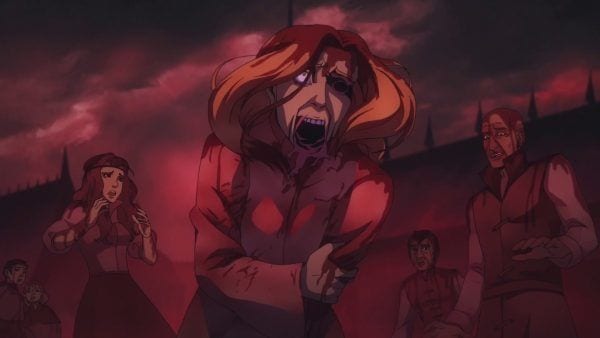
The first two episodes were a bit on the slow side, yet what action scenes we got were so brilliantly done that we can forgive this issue, especially with the small scenes that give us healthy amounts of blood and gore and lavish and fluid fighting. While the final two episodes will probably be more action-oriented, it makes me sad that they are the only two. Yet, it has already been announced that the series will be renewed for a second season, hopefully one that is twice as long!
Random Observations & Scores
- Excellent world building
- Great introduction to characters
- Homage to the game that fans of the series will appreciate
- Brings in lore from other titles of the game series
- Too short
- More action would be nice
- More personal history of Trevor and the Belmonts
- Why did everyone try and compare this to Game of Thrones??
Witchbottle: 9/10
Necropolis: 8/10

